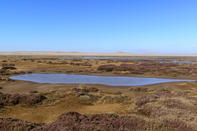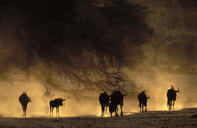Early Tampering
There may be reason to believe that our interference with the atmosphere goes back thousands of years before industrialisation began. A new theory has emerged, which implicates humans in tampering with global climate since we first started tilling the soil.

Marine geologist William Ruddiman, professor emeritus of environmental sciences at the University of Virginia, looked closely at greenhouse gases extracted from a 3 km ice core drilled from Antarctica Vostok Station during the 1990s. Air bubbles, captured and frozen in Antarctic ice for hundreds of thousands of years, confirmed that a rise and fall of methane and carbon dioxide levels coincided with the complex Milankovitch orbital cycles.
A warmer climate means more abundant plant growth in wetlands, translating into more material to decompose and emit methane. The reverse is true for cooler periods near the onset or exit of glacial periods where wetlands produce less plant material and hence less methane. The flux precisely matches the 22 000 year short-term precession in the Milankovitch cycle.
Carbon dioxide concentrations in the atmosphere also climb and fall in response to a more complicated series of triggers in the Milankovitch orbits. By 10 500 years ago, methane and carbon dioxide levels were at a natural peak, typical of previous interglacial periods on record in ice cores. In keeping with the normal cycle, both gases began to decrease and should have continued to do so until the present day as our system should currently be heading into a naturally cooler phase.
Better Chance at Survival

According to the Milankovitch orbits, Earth should be descending into an ice age in the next few hundred or, at most, the next few thousand years but enhanced global warming owing to agricultural practices may have made parts of the planet more favourable for our survival. During the past 2 000 years, there have been a few occasions where the CO concentrations have dropped quite drastically, taking the global temperature down with them.
Dissidents in the debate of global warming argue that global warming is good because much of the cold Northern Hemisphere will become more habitable. As conditions warm in the north, greater areas will become suitable for agriculture, thus benefiting food security. The problem with this argument is that while the north is warming and possibly thriving, many parts of the south are collapsing under drought. Another flaw in this debate is that we are conducting a dangerous and uncontrolled experiment.
We do not really know what will happen as we continue to add energy to the planetary system. Whatever the reason for the changes in atmospheric composition, there are some significant consequences. The average temperature has increased since 1861 when reliable weather records begin.
By Leonie Joubert